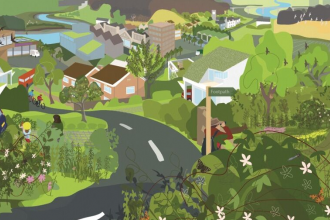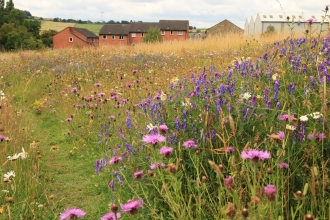A thriving natural environment is not a luxury - it is an urgent necessity. More than half of the UK's local authorities have declared a climate emergency. This is an excellent first step in tackling the climate and ecological crisis. But what next?
These ten simple actions for local authorities can help put nature into recovery and make our towns and countryside thriving, healthy green spaces for people and for wildlife.
1. Get nature on your side
Habitat restoration and carbon sequestration are key to tackling the emergency. Planting trees, restoring wetlands and enhancing other precious habitats is vital for people and nature to thrive in a changing world.
2. Create a Nature Recovery Network
A Nature Recovery Network enables plants and animals to move as the environment changes, and identifies the areas where significant gains for wildlife can be achieved. It should be written into local plans for public and private land.
3. Make green decisions
Ensure that tackling the emergency is a central consideration in all decisions. All proposals should contribute to restoring our natural environment. Give a cabinet councillor responsibility for creating an action plan.
4. Provide the resources
Ensure funds are allocated to implement a Nature Recovery Network. Fund Environmental Records Centres and Local Wildlife Sites Projects. Ensure enough ecology officers are retained to deal with ever more development.
5. Lead by example
Ensure all council-owned buildings are fitted with high standards of insulation, and source their energy from renewable energy suppliers. Manage public land, such as parks, road verges and lakes for the benefit of wildlife.

A vision of Britain in 2040 by Nik Pollard
6. Plan solutions, not problems
Land-use planning must help achieve emissions reduction targets and net gain for biodiversity. Protect Local Wildlife Sites and priority habitats. Require all developments to be carbon neutral, with the highest energy efficiency.
7. Use water wisely
Reduce water usage on council-owned land. Require all new development and infrastructure projects to meet the highest standards of water efficiency. Ensure that SuDS schemes are designed to maximise benefits for wildlife.
8. Decarbonise transport
Move towards a system based on public transport, walking, and cycling. Promote electric vehicles and buses. Make all council vehicles and licensed taxis electric. Manage verges to support wildflowers. Fit bus stops with green roofs.
9. Chase energy efficiency
Increase energy efficiency and reduce reliance on fossil fuels: identify new sites for renewable energy projects. Refuse to permit fossil fuel extraction. Require developments to include renewable energy and district heating systems.
10. Work with others
Work with regional transport bodies, LNPs, LEPs, businesses and schools to encourage and support their contribution to fighting the emergency. Join with other councils to demand of central government the powers and funds you need.
Find out more
Get in touch
Do you work for a local authority and would like more information about how you can help tackle the climate and ecological emergencies?



